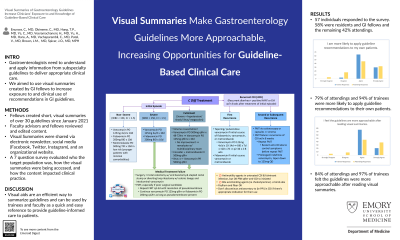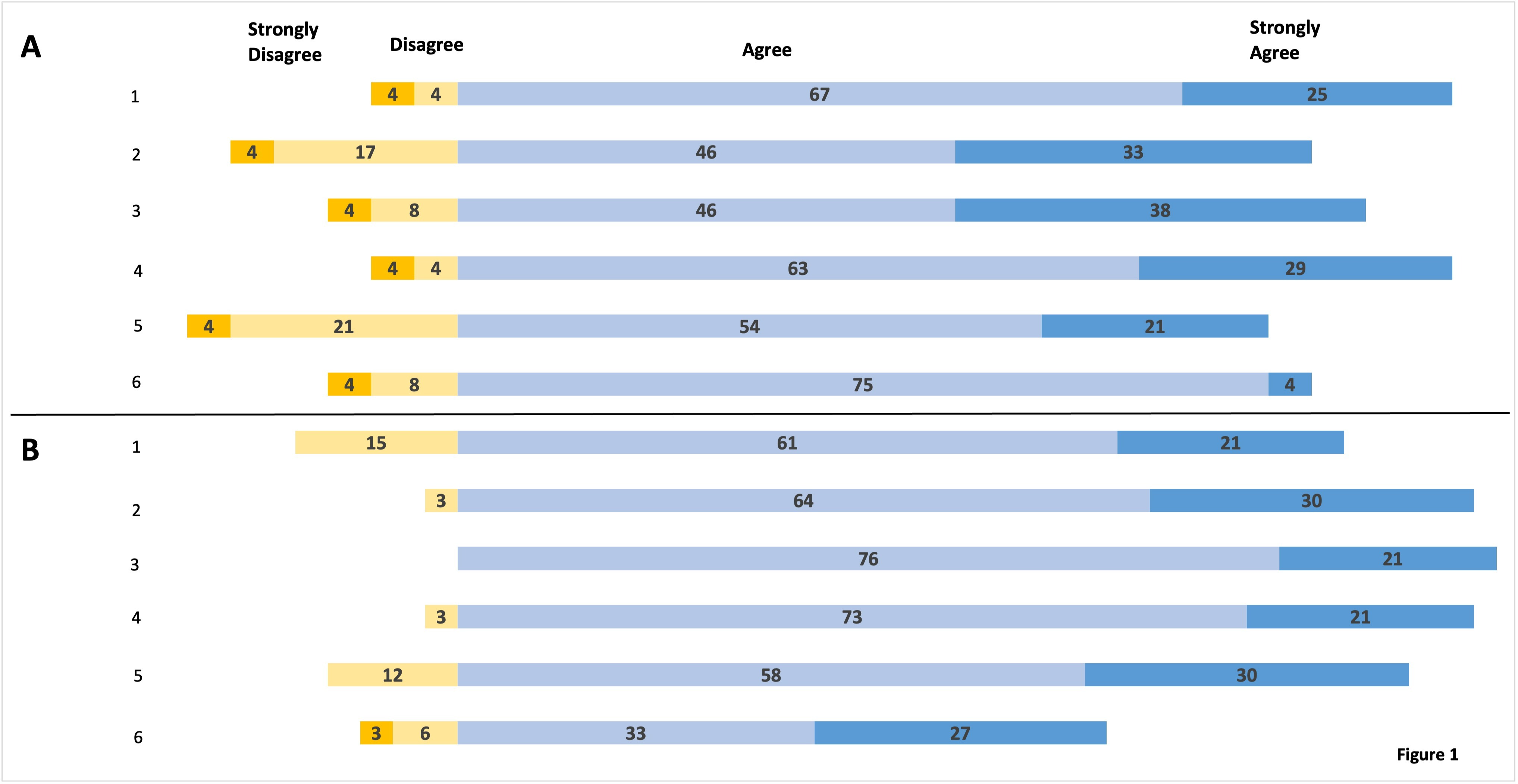Back


Poster Session A - Sunday Afternoon
Category: Practice Management
A0627 - Visual Summaries of Gastroenterology Guidelines Increase Clinicians' Exposure to and Knowledge of Guideline-Based Clinical Care
Sunday, October 23, 2022
5:00 PM – 7:00 PM ET
Location: Crown Ballroom

Has Audio

Chidiebele Enunwa, MD
Emory Internal Medicine
Atlanta, GA
Presenting Author(s)
Chidiebele Enunwa, MD1, Chuma Obineme, MD2, Thuy-Van P. Hang, MD2, Chengcheng Ye, MD2, Hima Veeramachaneni, MD2, Michael Andrew Yu, MD2, Amneet Hans, MD3, Cicily Vachaparambil, MD2, Vaishali Patel, MD2, Jason M. Brown, MD4, Jennifer O. Spicer, MD, MPH2
1Emory Internal Medicine, Atlanta, GA; 2Emory University School of Medicine, Atlanta, GA; 3Weill Cornell Medicine, Glen Oaks, NY; 4Emory University, Atlanta, GA
Introduction: Gastroenterologists need to understand and apply information from subspecialty guidelines to deliver appropriate clinical care. In busy clinical practice, however, it can be difficult to keep up with newly published guidelines as they are frequently released from multiple independent societies and can be lengthy. To address this issue, gastroenterology (GI) fellows at a large academic institution created concise visual summaries of recently published GI guidelines and disseminated them via an electronic newsletter and social media.
Methods: Gastroenterology fellows created short, visual summaries of two recently published guidelines per month since January 2021. GI faculty mentors at our institution reviewed content for accuracy prior to distribution via a monthly electronic newsletter, social media (Twitter, Instagram, and Facebook), and an organizational website. Over 16 months, more than 30 summaries were created to cover various topics within GI applicable for both inpatient and outpatient settings. We developed a short 7 question survey to evaluate who the target population was, how the visual summaries were being accessed, and how the content impacted clinical practice. We distributed the survey via email to GI fellows, residents, and faculty at our institution, as well as our monthly newsletter recipients and over social media in May 2022. The survey was exempt from IRB approval since it was a program evaluation.
Results: A total of 57 individuals responded to the survey, 58% of whom are residents and GI fellows and the remaining 42% attendings. Attending respondents included general gastroenterologists (33%), subspecialized gastroenterologists (58%), and other medical specialties (8%). Most respondents (93%) worked at an academic institution, of whom 42% are attendings, 42% fellows, and 17% residents or students. Individuals typically accessed the visual summaries via social media (49%) or the emailed newsletter (37%). Figure 1 shows how interaction with the visual summaries impacted clinicians’ exposure to and knowledge of clinical guidelines.
Discussion: Visual aids are an efficient way to summarize guidelines and can be used by trainees and faculty as a quick and easy reference to provide guideline-informed care to patients. Distribution over social media provides an additional opportunity to reach clinicians worldwide.

Disclosures:
Chidiebele Enunwa, MD1, Chuma Obineme, MD2, Thuy-Van P. Hang, MD2, Chengcheng Ye, MD2, Hima Veeramachaneni, MD2, Michael Andrew Yu, MD2, Amneet Hans, MD3, Cicily Vachaparambil, MD2, Vaishali Patel, MD2, Jason M. Brown, MD4, Jennifer O. Spicer, MD, MPH2. A0627 - Visual Summaries of Gastroenterology Guidelines Increase Clinicians' Exposure to and Knowledge of Guideline-Based Clinical Care, ACG 2022 Annual Scientific Meeting Abstracts. Charlotte, NC: American College of Gastroenterology.
1Emory Internal Medicine, Atlanta, GA; 2Emory University School of Medicine, Atlanta, GA; 3Weill Cornell Medicine, Glen Oaks, NY; 4Emory University, Atlanta, GA
Introduction: Gastroenterologists need to understand and apply information from subspecialty guidelines to deliver appropriate clinical care. In busy clinical practice, however, it can be difficult to keep up with newly published guidelines as they are frequently released from multiple independent societies and can be lengthy. To address this issue, gastroenterology (GI) fellows at a large academic institution created concise visual summaries of recently published GI guidelines and disseminated them via an electronic newsletter and social media.
Methods: Gastroenterology fellows created short, visual summaries of two recently published guidelines per month since January 2021. GI faculty mentors at our institution reviewed content for accuracy prior to distribution via a monthly electronic newsletter, social media (Twitter, Instagram, and Facebook), and an organizational website. Over 16 months, more than 30 summaries were created to cover various topics within GI applicable for both inpatient and outpatient settings. We developed a short 7 question survey to evaluate who the target population was, how the visual summaries were being accessed, and how the content impacted clinical practice. We distributed the survey via email to GI fellows, residents, and faculty at our institution, as well as our monthly newsletter recipients and over social media in May 2022. The survey was exempt from IRB approval since it was a program evaluation.
Results: A total of 57 individuals responded to the survey, 58% of whom are residents and GI fellows and the remaining 42% attendings. Attending respondents included general gastroenterologists (33%), subspecialized gastroenterologists (58%), and other medical specialties (8%). Most respondents (93%) worked at an academic institution, of whom 42% are attendings, 42% fellows, and 17% residents or students. Individuals typically accessed the visual summaries via social media (49%) or the emailed newsletter (37%). Figure 1 shows how interaction with the visual summaries impacted clinicians’ exposure to and knowledge of clinical guidelines.
Discussion: Visual aids are an efficient way to summarize guidelines and can be used by trainees and faculty as a quick and easy reference to provide guideline-informed care to patients. Distribution over social media provides an additional opportunity to reach clinicians worldwide.

Figure: Figure 1 shows the percentage of responses to Likert-style questions separated by level of training. Panel A represents attending responses, while Panel B represents fellow and resident responses. Question 1 - I am more aware of when my decisions deviate from guideline recommendations. Question 2 - I am more likely to apply guideline recommendations to my own patients. Question 3 - I feel the guidelines are more approachable after reading visual summaries. Question 4 - I am more likely to remember recommendations from the guidelines after reading visual summaries. Question 5 - I am more likely to read GI Guidelines after reading visual summaries. Question 6 - I learned information from the Visual Abstract that I did not know previously.
Disclosures:
Chidiebele Enunwa indicated no relevant financial relationships.
Chuma Obineme indicated no relevant financial relationships.
Thuy-Van Hang indicated no relevant financial relationships.
Chengcheng Ye indicated no relevant financial relationships.
Hima Veeramachaneni indicated no relevant financial relationships.
Michael Andrew Yu indicated no relevant financial relationships.
Amneet Hans indicated no relevant financial relationships.
Cicily Vachaparambil indicated no relevant financial relationships.
Vaishali Patel indicated no relevant financial relationships.
Jason Brown indicated no relevant financial relationships.
Jennifer Spicer indicated no relevant financial relationships.
Chidiebele Enunwa, MD1, Chuma Obineme, MD2, Thuy-Van P. Hang, MD2, Chengcheng Ye, MD2, Hima Veeramachaneni, MD2, Michael Andrew Yu, MD2, Amneet Hans, MD3, Cicily Vachaparambil, MD2, Vaishali Patel, MD2, Jason M. Brown, MD4, Jennifer O. Spicer, MD, MPH2. A0627 - Visual Summaries of Gastroenterology Guidelines Increase Clinicians' Exposure to and Knowledge of Guideline-Based Clinical Care, ACG 2022 Annual Scientific Meeting Abstracts. Charlotte, NC: American College of Gastroenterology.
